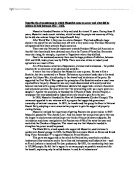In 1935 Mussolini wrote, "For Fascism the state is absolute, individuals and groups relative." Show how his rule of Italy reflected these beliefs.
In 1935 Mussolini wrote, "For Fascism the state is absolute, individuals and groups relative." Show how his rule of Italy reflected these beliefs.
For Mussolini, coming into power meant he was going to have the chance to reestablish Italy as a great European power. Unlike the communist philosophy, the fascist philosophy, which Mussolini followed, sought to regenerate the social, economic, and cultural life of a country by basing it on a heightened sense of national belonging. The preceding quote stated just this; Mussolini was determined to put state affairs over individual ones. He was determined to improve political, economic, and social policies.
First of all, Mussolini ran Italy's political system with vigor. He was seen by many Italian citizens as a Godsend, for he offered them jobs, guarantees against communism, and land (for the peasants). Mussolini mostly used force to keep the little opposition he had at a minimum. His alliance with the Black Shirts, a paramilitary organization, was beneficial, for they silenced any of those who spoke against the Fascist. As a dictator, Mussolini also continued his rule by censoring the press. Newspaper editors were no longer chosen at random, Mussolini personally chose the editors, and no one who did not possess a certificate of approval from the Fascist party could practice journalism. Trade unions were also deprived of any independence and were integrated. The aim of such integration was to place all Italians in various professional organizations or corporations, all of them under governmental control. Mussolini, by instating this, was able to overcome the class conflicts and bring the Italian people together. Unlike his communist precedents, Mussolini did not have any objection to class structures. Mussolini also further unified the people with the Lateran Pacts (in 1929) made with Pope Pius XI, which made Roman Catholicism the official state religion, recognized the independence of the Vatican and joined the church and state. Of course, the idea behind this pact was to gain more support from the people, but, either way, he received more support from his subordinates.
For Mussolini, coming into power meant he was going to have the chance to reestablish Italy as a great European power. Unlike the communist philosophy, the fascist philosophy, which Mussolini followed, sought to regenerate the social, economic, and cultural life of a country by basing it on a heightened sense of national belonging. The preceding quote stated just this; Mussolini was determined to put state affairs over individual ones. He was determined to improve political, economic, and social policies.
First of all, Mussolini ran Italy's political system with vigor. He was seen by many Italian citizens as a Godsend, for he offered them jobs, guarantees against communism, and land (for the peasants). Mussolini mostly used force to keep the little opposition he had at a minimum. His alliance with the Black Shirts, a paramilitary organization, was beneficial, for they silenced any of those who spoke against the Fascist. As a dictator, Mussolini also continued his rule by censoring the press. Newspaper editors were no longer chosen at random, Mussolini personally chose the editors, and no one who did not possess a certificate of approval from the Fascist party could practice journalism. Trade unions were also deprived of any independence and were integrated. The aim of such integration was to place all Italians in various professional organizations or corporations, all of them under governmental control. Mussolini, by instating this, was able to overcome the class conflicts and bring the Italian people together. Unlike his communist precedents, Mussolini did not have any objection to class structures. Mussolini also further unified the people with the Lateran Pacts (in 1929) made with Pope Pius XI, which made Roman Catholicism the official state religion, recognized the independence of the Vatican and joined the church and state. Of course, the idea behind this pact was to gain more support from the people, but, either way, he received more support from his subordinates.







